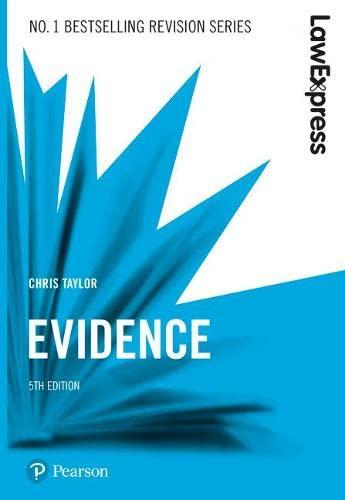Question
California lawmakers passed the Three Strikes Law in March 1994, following the high- profile kidnapping and murder of 12-year-old Polly Klaas. Her abductor was a
"California lawmakers passed the "Three
Strikes" Law in March 1994, following the high-
profile kidnapping and murder of 12-year-old
Polly Klaas. Her abductor was a violent offender
out on parole, living in the Klaas family's community.
Outraged by this awful crime and
eager for the legislature to get tougher on crime,
California voters overwhelmingly approved
Proposition 184. This law was designed to
deter offenders from committing new crimes
by requiring longer prison terms for criminals
who had been convicted of felonies in the past.
By the late 1990s, about 40 states had some
form of recidivist statute, a law designed spe-
cifically to punish serious repeat offenders.
Under California's Three Strikes Law, a
"strike" is a conviction for a serious or violent
felony. When a defendant has one strike, con-
viction for the second strike results in doubling
the usual sentence for that crime. If a defen-
dant is convicted of a third felony, the law
requires that he or she receive a sentence of at
least 25 years to life, with no possibility of
parole before 25 years.
While strikes one and two must be for
serious or violent felonies, any felony conviction
will qualify as the third strike, whether or not
the felony was serious or violent. In addition,
certain offenses (called "wobblers") can be
prosecuted as either misdemeanors or felonies,
at the discretion of the prosecutor or the
judge. Finally, the Three Strikes Law is retroac-
tive and is not limited to crimes committed in
California. Therefore, convictions from before
the law was passed (1994) or in other states
can count as strikes.
In November 1995, Leandro Andrade
attempted to steal five G-rated videotapes
but was arrested upon leaving the store. Two
weeks later, Andrade was arrested outside
another store for attempting to steal more
videotapes. The total value of all the tapes
was approximately $150. Andrade, a longtime
heroin addict, had a 15-year criminal history
with five felonies and two misdemeanors on
his record. None of the previous convictions
were for violent offenses. Prosecutors deter-
mined that he already had two strikes under
the California law when the prosecution for
the most recent thefts commenced. Under
California law, petty theft with a prior convic-
tion is one of the so-called wobblers, misde-
meanors that can be prosecuted as felonies.
Andrade, then 37, was convicted and sen-
tenced to 25 years to life for each of the two
petty theft counts (strikes three and four).
According to the Three Strikes Law, those sen-
tences must be served consecutively, not con-
currently, so Andrade will not become
eligible for parole for 50 years.
A federal appeals court found his sentence
"grossly disproportionate" to the crime and
a violation of the Eighth Amendment's prohi-
bition against cruel and unusual punishment.
Prosecutors for the state of California appealed
to the U.S. Supreme Court."
Problem 15.1: The Three Strikes Law (Open the Chapter 15 PDF Page 175)
a. Why did California pass the Three Strikes Law? Why do you think these laws have become so popular in the United States? Answer:
b. What are the most convincing arguments for upholding Andrade's sentence?
c. What are the most convincing arguments for reversing the sentence?
d. How should the Court decide the Andrade case? What arguments might the dissenting justices make?
e. As a matter of public policy, do you support or oppose laws like the Three Strikes Law?
Step by Step Solution
There are 3 Steps involved in it
Step: 1

Get Instant Access to Expert-Tailored Solutions
See step-by-step solutions with expert insights and AI powered tools for academic success
Step: 2

Step: 3

Ace Your Homework with AI
Get the answers you need in no time with our AI-driven, step-by-step assistance
Get Started


